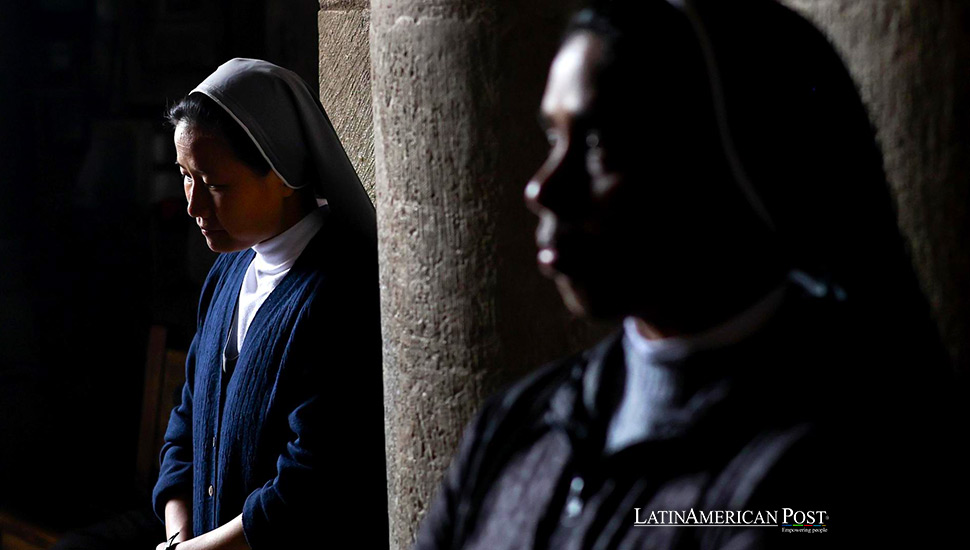Argentine Nuns Challenge Clerical Abuse in Historic Verdict

In Argentina, a judge ruled that 20 nuns endured decades of abuse by high-ranking clergy, leading to a landmark decision mandating psychological treatment for the accused. This case illuminates the broader issue of gender discrimination within the Catholic Church in Latin America.
In a groundbreaking decision from Salta, northwestern Argentina, a local judge recognized the prolonged suffering of 20 cloistered nuns subjected to abuse by senior clergy members. This judgment not only highlights a specific grievance but also casts a wider beam on the systemic issues of gender violence and discrimination within the Catholic Church, resonating across Latin America.
Exposing Abuse
The ruling from Judge Carolina Cáceres marked a significant moment in the Catholic-majority country, where such issues have traditionally been shrouded in silence. The nuns, part of the Discalced Carmelites order in San Bernardo Monastery, accused Archbishop Mario Cargnello and other church officials of various forms of abuse, including physical aggression and economic exploitation, over more than two decades.
The case, rooted in the conservative region of Salta, has shattered the longstanding silence surrounding the mistreatment of nuns within the church’s hierarchy. The accused clergymen, denying the allegations, faced a court order for psychological assessment and training on gender discrimination. This directive underscores the judiciary’s intent to address the underlying issues of power and gender inequity.
This legal action in Argentina, the birthplace of Pope Francis, spotlights the broader narrative of abuse within the church. This narrative has gained increasing visibility globally thanks to movements like #MeToo and its ecclesiastical counterpart, #NunsToo. These movements have emboldened nuns and laywomen to voice their experiences of spiritual, psychological, and physical abuse, challenging the institutional structures that have long enabled such injustices.
Holding Religious Figures Accountable
The Salta case represents a pivotal shift, demonstrating the potential of secular justice systems to hold influential religious figures accountable. The verdict, described as unprecedented by the nuns’ legal counsel, José Viola, signifies a break from the past, challenging the church’s and society’s entrenched power dynamics.
The issue of clerical abuse against nuns is not confined to Argentina but echoes across Latin America, where the Catholic Church wields significant influence. Similar stories have surfaced in countries like Chile, Mexico, and Brazil, where nuns and religious women have come forward with allegations of abuse, often met with indifference or denial by church authorities.
The plight of the Discalced Carmelites in Salta, who lived in a secluded environment dedicated to contemplation and prayer, underscores the pervasive nature of this issue. Their courage in bringing the case to the secular courts reflects a growing determination among victims of pastoral abuse to seek justice outside the church’s traditional power structures.
This legal outcome in Argentina may catalyze change, encouraging others within the church and across Latin America to confront and address the deeply entrenched patterns of abuse and discrimination. The international attention drawn by this case highlights the need for systemic change within the Catholic Church, emphasizing the importance of transparency, accountability, and respect for women’s rights and dignity.
A Step Towards Justice and Equality
Moreover, the response to the Salta verdict could influence how other Latin American countries handle similar allegations, potentially leading to a regional shift in addressing and preventing gender violence within religious institutions. It stresses the imperative for the Catholic Church, both in Latin America and globally, to reckon with its internal issues of gender discrimination and to implement reforms that ensure the safety and respect of all its members.
The Salta case is more than a local or national issue; it reflects the broader struggles within the Catholic Church and society to address historical injustices and move towards a more equitable and respectful future. The courage of the Salta nuns in seeking justice and the subsequent legal ruling may mark a turning point in how the Catholic Church confronts and rectifies the long-overlooked issue of gender violence within its ranks.
Also read: Argentina’s Falklands Stance Softens Under Milei’s Rule
The ruling against the high-ranking clergy in Argentina for the abuse of nuns represents a significant moment in the global effort to combat gender violence and discrimination within the Catholic Church. It underscores the importance of legal and societal recognition of these issues and sets a precedent for addressing similar abuses in Latin America and beyond. As the church and society continue to evolve, the hope is that such landmark cases will pave the way for a future where respect, equality, and justice prevail for all individuals, irrespective of their religious or institutional affiliations.





